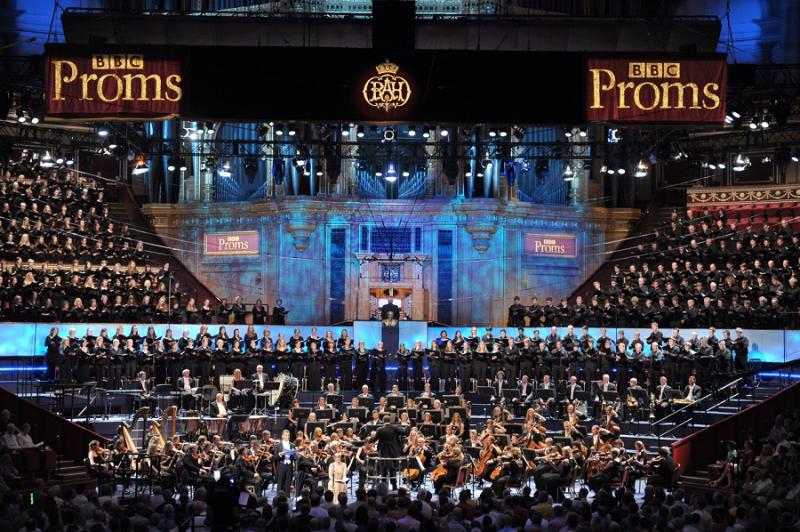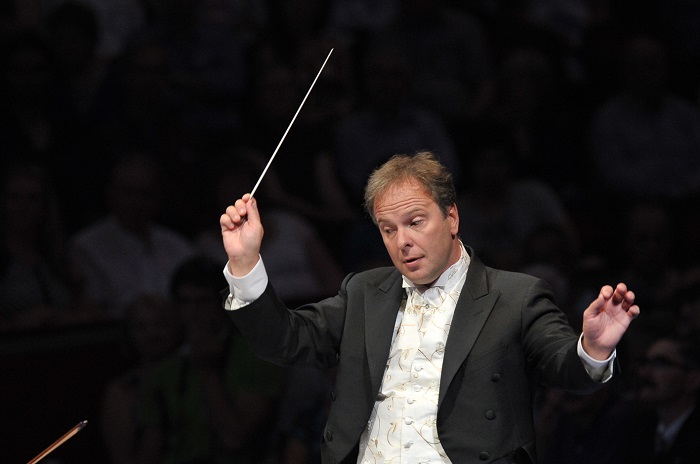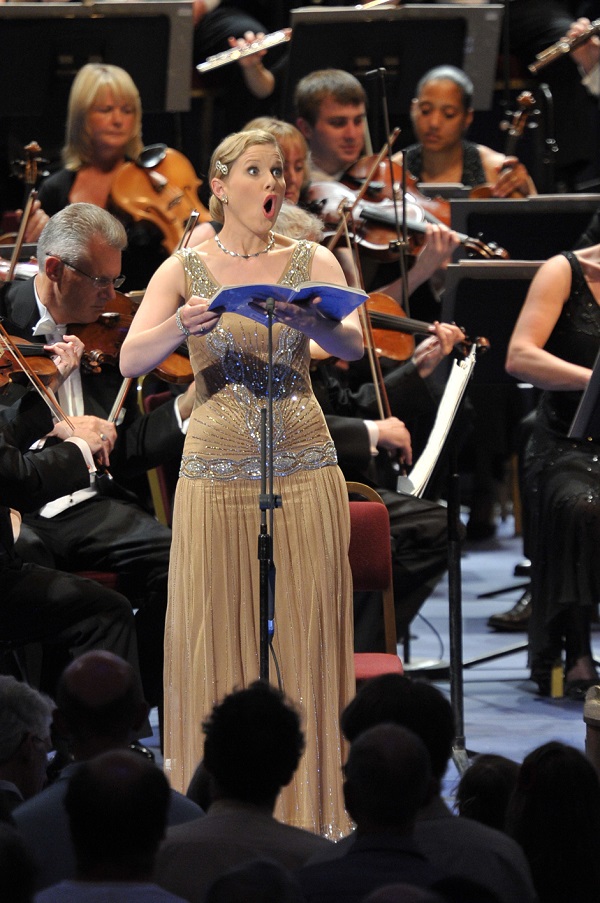First Night of the 2013 Proms | reviews, news & interviews
First Night of the 2013 Proms
First Night of the 2013 Proms
Sakari Oramo encounters stormy seas in his debut as Chief Conductor of the BBCSO

What a way to open. Vaughan Williams’s A Sea Symphony is exactly the kind of work that the BBC Proms and the Royal Albert Hall were made for, and as the surging, over-generous music and Walt Whitman’s ecstatic poetry ring out across the space it’s hard not to feel just a little bit of heart-swell. Add to that conductor Sakari Oramo making his debut as Chief Conductor of the BBC Symphony Orchestra and you have a First Night to rival the excitement of the Last Night.
What a shame then that it was such an uneven evening of music. Like Britten and Vaughan Williams’s stormy seas, the highs and lows chased and tussled with one another, leaving us thrilled by the scope of the symphony but cheated by the loss of the first half’s smaller-scale thrills.
Few pianists have the musical wit of Stephen Hough
It was bold to open with a new commission from Julian Anderson, but sadly his five-minute tone poem Harmony for orchestra and choir had little to add to the Englishness already programmed from his predecessors. Written in the familiar language of 20th century English lyricism, the work is blighted by a fussy text from Richard Jefferies' The Story of My Heart. The words muse incoherently on the essence of time, but a lack of clarity in the diction of the BBC Symphony Chorus meant that at least we didn’t have to ponder them too closely. High string and soprano shimmer gives way to cluster chords and then to a fragmented, rhythmic section. It’s all pleasant enough, but not quite the “flash of revelation” I was hoping for.
 Few pianists have the musical wit of Stephen Hough, and his understated English elegance met Slavic passion with delicious friction in Rachmaninov’s Rhapsody on a Theme of Paganini, brilliantly programmed alongside Lutoslawski’s Variations on a Theme by Paganini. This latter is so cogent, so engaging a work as to provide the perfect launch of the composer’s anniversary year at the Proms (he’s generously represented in five more concerts, and with good reason), even if it was almost at the expense of Rachmaninov’s rather weightier treatment.
Few pianists have the musical wit of Stephen Hough, and his understated English elegance met Slavic passion with delicious friction in Rachmaninov’s Rhapsody on a Theme of Paganini, brilliantly programmed alongside Lutoslawski’s Variations on a Theme by Paganini. This latter is so cogent, so engaging a work as to provide the perfect launch of the composer’s anniversary year at the Proms (he’s generously represented in five more concerts, and with good reason), even if it was almost at the expense of Rachmaninov’s rather weightier treatment.
Playing against the grain of the Rachmaninov, Hough found a throwaway charm to the virtuosity and an ease to the lyric passages that refreshed this war-horse. Under Oramo (pictured above right), however, the musicians of the BBCSO weren’t entirely on board with their conductor's interpretation, and brass blotted and smudged their interjections into Hough’s solo passages, while strings disagreed amongst themselves. It was an issue that also emerged in Britten’s Four Sea Interludes, which lacked the impulsion of Ed Gardner and English National Opera’s performance last year. Storm was scrappy and a bit of a scramble, and had little connection to the too-restrained Dawn or Moonlight, where orchestral textures were beautifully translucent but lacking the anchoring weight needed from the strings.
 But redemption was at hand in A Sea Symphony, where the forces suddenly seemed certain of what they were doing, and Oramo finally showed off his ability to craft long-form structure after a choppy sequence of lollipops. No one writes a triplet quite like Vaughan Williams, and under Oramo’s direction the BBCSO found endless expressive variations on this throbbing rhythmic idée fixe. The choirs were joined by soloists Roderick Williams and Sally Matthews (pictured left). whose duet in The Explorers was transfixing, drawing us all into their tiny, intimate musical space. A similar magic happened in the fleeting moment for semi-chorus, where upper voices from the BBC Proms Youth Choir coaxed a warm and sleepy audience into sudden focus. It would have been lovely to hear more from the Youth Choir, who felt short-changed here, with little of the opportunity to show the extent of their quality that A Child of Our Time offered so strikingly last year.
But redemption was at hand in A Sea Symphony, where the forces suddenly seemed certain of what they were doing, and Oramo finally showed off his ability to craft long-form structure after a choppy sequence of lollipops. No one writes a triplet quite like Vaughan Williams, and under Oramo’s direction the BBCSO found endless expressive variations on this throbbing rhythmic idée fixe. The choirs were joined by soloists Roderick Williams and Sally Matthews (pictured left). whose duet in The Explorers was transfixing, drawing us all into their tiny, intimate musical space. A similar magic happened in the fleeting moment for semi-chorus, where upper voices from the BBC Proms Youth Choir coaxed a warm and sleepy audience into sudden focus. It would have been lovely to hear more from the Youth Choir, who felt short-changed here, with little of the opportunity to show the extent of their quality that A Child of Our Time offered so strikingly last year.
As the season continues we can hope and expect that Oramo and the BBCSO find their mutual stride. As a starting point this was promising enough, but I’m hoping for much, much more by season’s end.
rating
Explore topics
Share this article
Add comment
The future of Arts Journalism
You can stop theartsdesk.com closing!
We urgently need financing to survive. Our fundraising drive has thus far raised £49,000 but we need to reach £100,000 or we will be forced to close. Please contribute here: https://gofund.me/c3f6033d
And if you can forward this information to anyone who might assist, we’d be grateful.

Subscribe to theartsdesk.com
Thank you for continuing to read our work on theartsdesk.com. For unlimited access to every article in its entirety, including our archive of more than 15,000 pieces, we're asking for £5 per month or £40 per year. We feel it's a very good deal, and hope you do too.
To take a subscription now simply click here.
And if you're looking for that extra gift for a friend or family member, why not treat them to a theartsdesk.com gift subscription?
more Classical music
 BBC Proms: Ehnes, Sinfonia of London, Wilson review - aspects of love
Sensuous Ravel, and bittersweet Bernstein, on an amorous evening
BBC Proms: Ehnes, Sinfonia of London, Wilson review - aspects of love
Sensuous Ravel, and bittersweet Bernstein, on an amorous evening
 Presteigne Festival 2025 review - new music is centre stage in the Welsh Marches
Music by 30 living composers, with Eleanor Alberga topping the bill
Presteigne Festival 2025 review - new music is centre stage in the Welsh Marches
Music by 30 living composers, with Eleanor Alberga topping the bill
 Lammermuir Festival 2025 review - music with soul from the heart of East Lothian
Baroque splendour, and chamber-ensemble drama, amid history-haunted lands
Lammermuir Festival 2025 review - music with soul from the heart of East Lothian
Baroque splendour, and chamber-ensemble drama, amid history-haunted lands
 BBC Proms: Steinbacher, RPO, Petrenko / Sternath, BBCSO, Oramo review - double-bill mixed bag
Young pianist shines in Grieg but Bliss’s portentous cantata disappoints
BBC Proms: Steinbacher, RPO, Petrenko / Sternath, BBCSO, Oramo review - double-bill mixed bag
Young pianist shines in Grieg but Bliss’s portentous cantata disappoints
 theartsdesk at the Lahti Sibelius Festival - early epics by the Finnish master in context
Finnish heroes meet their Austro-German counterparts in breathtaking interpretations
theartsdesk at the Lahti Sibelius Festival - early epics by the Finnish master in context
Finnish heroes meet their Austro-German counterparts in breathtaking interpretations
 Classical CDs: Sleigh rides, pancakes and cigars
Two big boxes, plus new music for brass and a pair of clarinet concertos
Classical CDs: Sleigh rides, pancakes and cigars
Two big boxes, plus new music for brass and a pair of clarinet concertos
 Waley-Cohen, Manchester Camerata, Pether, Whitworth Art Gallery, Manchester review - premiere of no ordinary violin concerto
Images of maternal care inspired by Hepworth and played in a gallery setting
Waley-Cohen, Manchester Camerata, Pether, Whitworth Art Gallery, Manchester review - premiere of no ordinary violin concerto
Images of maternal care inspired by Hepworth and played in a gallery setting
 BBC Proms: Barruk, Norwegian Chamber Orchestra, Kuusisto review - vague incantations, precise laments
First-half mix of Sámi songs and string things falters, but Shostakovich scours the soul
BBC Proms: Barruk, Norwegian Chamber Orchestra, Kuusisto review - vague incantations, precise laments
First-half mix of Sámi songs and string things falters, but Shostakovich scours the soul
 BBC Proms: Alexander’s Feast, Irish Baroque Orchestra, Whelan review - rapturous Handel fills the space
Pure joy, with a touch of introspection, from a great ensemble and three superb soloists
BBC Proms: Alexander’s Feast, Irish Baroque Orchestra, Whelan review - rapturous Handel fills the space
Pure joy, with a touch of introspection, from a great ensemble and three superb soloists
 BBC Proms: Moore, LSO, Bancroft review - the freshness of morning wind and brass
English concert band music...and an outlier
BBC Proms: Moore, LSO, Bancroft review - the freshness of morning wind and brass
English concert band music...and an outlier
 Willis-Sørensen, Ukrainian Freedom Orchestra, Wilson, Cadogan Hall review - romantic resilience
Passion, and polish, from Kyiv's musical warriors
Willis-Sørensen, Ukrainian Freedom Orchestra, Wilson, Cadogan Hall review - romantic resilience
Passion, and polish, from Kyiv's musical warriors
 BBC Proms: Faust, Gewandhausorchester Leipzig, Nelsons review - grace, then grandeur
A great fiddler lightens a dense orchestral palette
BBC Proms: Faust, Gewandhausorchester Leipzig, Nelsons review - grace, then grandeur
A great fiddler lightens a dense orchestral palette

Comments
I don't disagree with your
You've given discredit where
I am not sure as to what
Our PYC friends are quite
There is,I know,plenty of
Apologies to members of the
Apologies to members of the BBC Proms Youth Choir who were not singing in the Julian Anderson piece. Text now changed to reflect this and all blame for dodgy diction placed squarely with BBC Symphony Chorus.
Is there any need to be quite
I do think allowances might
You're right on so many